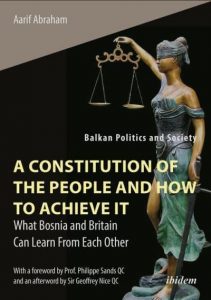Aarif Abraham asks whether Britain is in a constitutional crisis and makes the case, whether we are or are not, for new ways of thinking about its famous ‘unwritten’ constitution
 In the context of Britain’s famous unwritten or uncodified constitution, the words ‘constitutional crisis’ are bandied about with abandon. Serious political crises – where contentious government policy of the day is pushed through despite vociferous non-governmental opposition – are frequently designated as constitutional crises, particularly by the government’s detractors. From the Contagious Diseases Acts of the mid-19th century, which were ostensibly to tackle the prevalence of venereal disease, to the Coronavirus Act 2020, which seeks to tackle the current Covid-19 epidemic, the label ‘constitutional crisis’ has been seen to be apt. Government policy in both instances had a significant and extraordinary impact on the rights of a large section of the people as well as the ability of parliament to represent the people. The successful protests against the Contagious Diseases Acts hastened the advent of women’s suffrage. The long-term impact, if any, of the Coronavirus Act 2020 is yet to be seen.
In the context of Britain’s famous unwritten or uncodified constitution, the words ‘constitutional crisis’ are bandied about with abandon. Serious political crises – where contentious government policy of the day is pushed through despite vociferous non-governmental opposition – are frequently designated as constitutional crises, particularly by the government’s detractors. From the Contagious Diseases Acts of the mid-19th century, which were ostensibly to tackle the prevalence of venereal disease, to the Coronavirus Act 2020, which seeks to tackle the current Covid-19 epidemic, the label ‘constitutional crisis’ has been seen to be apt. Government policy in both instances had a significant and extraordinary impact on the rights of a large section of the people as well as the ability of parliament to represent the people. The successful protests against the Contagious Diseases Acts hastened the advent of women’s suffrage. The long-term impact, if any, of the Coronavirus Act 2020 is yet to be seen.
Are we though currently in a constitutional crisis? If we are, is it temporary or terminal? And if not terminal, is there a prescription for this age-old malady? And would these prescriptions be a quick fix or a quack elixir?
A constitutional crisis is something beyond the contestations of day-to-day politics. While there is no formal definition, it may describe a situation where the governing party does away with a fundamental constitutional rule or convention, or bypasses some key institutional check allowing unconstrained government decision-making. In response, a powerful stakeholder, usually a large cross-section of people, will react causing polarisation. But in Britain’s constitutional system what is a political crisis between diametrically opposed political camps is hard to delineate from what is a fundamental threat to its core constitutional structure. The fact that the structure is nebulous is an obvious problem.
Britain is a long-established representative democracy, comprising four nations, with an uncodified, non-federal constitutional arrangement. The constitutional arrangements seem to have worked relatively well for the past 350 years in maintaining stability and adapting to needed political as well as socio-economic change. The British constitution does not have a formal mechanism to give priority or permanence to one piece of legislation above another. This means that, where political practice is accommodating and respectful of traditions, adapting the constitution in accordance with changes in society is evidently much easier than in formal codified constitutional structures which impose formalities and rigidities absent in Britain.
Responsible political elites, historically, would have been careful not to change the rules of the game in a way that completely benefitted only one party. Upon losing power they risked the same treatment or, worse, the unconstrained wrath of the people. Constitutional decisions, in the language of game theory, were inter-temporal bargains. But has acute polarisation in today’s Britain jeopardised inter-temporal punishment and rewards?
There is deep contestation between the political elites of different parties in many areas including over: devolution and independence of the nations and the regions; representation in Parliament; Parliament’s ability to scrutinise government policy; fair distribution of wealth and socio-economic entitlements; and human rights and judicial power. The contestation arises because constitutional tinkering in Britain, a partisan change here and piecemeal alteration there, has put the constitutional structure at risk. For instance, Wales, NI, Scotland and England have completely different models of local government and it is not clear where common competencies lie. The executive has also taken over the institutions of state at the expense of democratic accountability. For instance, the government has passed hundreds of pieces of delegated legislation without any parliamentary scrutiny including criminal laws where a permissible activity one night becomes a crime the next.v Is the British constitution being flexed to breaking point?
A number of recent crises have clearly put the constitution to the test. The crises include: the process leading to the UK withdrawal from the European Union (‘Brexit’); constant appeals for secession from Scotland or the ‘re-union’ of Northern Ireland with Ireland; the breakdown of centuries-old conventions as seen with the unlawful prorogation of Parliament by the executive in 2019; the placing of significant limits on Parliamentary scrutiny by the executive (as seen with the unconstrained use of delegated legislation after leaving the EU or the exercise of extraordinary executive powers under Coronavirus regulations); and a lack of adherence to important international norms as seen by a sustained campaign to dilute adherence to human rights treaty obligations (such as limitations on UK soldiers’ accountability for international crimes or possible repeal of the Human Rights Act 1998 (giving effect to the European Convention on Human Rights) or curtailment of judicial review).
The crises emanate not from the fact that certain party policies, such as the Brexit and ‘independence’ referenda or changes to the judicial system, were pursued – I take for the purposes of this piece no particular position on any particular policy – but because they were pursued in a process which was piecemeal and/or highly partisan. This is not a singular critique of Labour or the Conservatives or the SNP (as the dominant parties) but of all equally.
Brexit was a failure not because people decided to leave the EU. It was a failure for a whole host of reasons related to the process of the unprecedented national referendum (and only its third in its history) which bypassed a sovereign parliament. The referendum was crude as it posed a binary question on a complicated issue. As a result, both the debate and the outcome (which some have argued had little in common with the debate) helped to create division, denunciation, and uncertainty. It reflected in reality only the will of 37% of the population (although some 400 out of 600 constituencies but not Scotland or Northern Ireland’s). We can ask now, quite sensibly, why the referendum question was not multi-option, subject to a high-approval threshold and required the concurrent assent of the people(s) in each nation. None of that would have been especially novel. The British pioneered, for instance, one of the world’s first two-stage multi-option referendum in Newfoundland in 1948. Whilst many criticised the Brexit process after the outcome of the referendum it should be noted that the referendum bill was only opposed at second reading by the SNP.
Similarly, on human rights and contestation around the powers of the judiciary each of the major parties appear culpable. Labour spearheaded the closure of a large number of courts, began the process of curtailing legal aid and used expansive anti-terrorism laws that fell afoul of human rights norms. The Lib-Dem-Conservative Coalition fast-tracked all those policies in an effort to save just £950 million per annum but creating in the process vast legal aid deserts, insurmountable court backlogs and an increasingly unfair and monetised justice system – impacting all manner of people’s lives from immigration to divorce. The Conservative Party – misunderstanding symptom from cause – is now taking those initiatives to their (perhaps logical) conclusions by arguing that judges and ‘activist lawyers’ are impermissibly entering into the policy sphere and preventing government decision-making on immigration, crime, housing and so forth.
What makes this current period exceptional is that the political crises aforementioned all have (and had) foreseeable existential constitutional consequences for the Union. The classic British fudge will not arrest their development. There appears to be an almost inevitable forthcoming clash between the possible newly elected secessionists in Holyrood and Cardiff Bay in May 2021 and centrists who are the incumbents in Westminster. Support for Welsh independence currently is polling at 39%; the highest it has ever been with Plaid Cymru pledging a referendum if they form a majority in the elections.xv Sinn Fein has called for a referendum on a United Ireland although a return to violence in Northern Ireland (precisely because of the Brexit withdrawal agreement and the Northern Ireland protocol) puts that into question.
There is also likely to be a constant to-and-fro between the government incumbents and opposition on human rights and judicial review regardless of what people really think about human rights and judges (for instance, all polls to date show strong support for existing rights). This is at the expense of understanding and addressing underlying problems (for instance, the allocation and funding policy for proven asylum seekers, who face serious risk if sent back to their home countries, which sees them disproportionally placed in the poorest local authorities).
Major constitutional reform is often the result of major crisis in particular war and/or revolution. Some have hoped for a major crisis to precipitate change in Britain. The question is, can Britain afford to wait for the break-up of the Union, for the decimation of what was once seen as a ‘world class’ judicial system, or deepening polarisation on class, national or cultural grounds? Constitutional moments creates winners and losers and in these cases the damage then would be irreversible.
But the major policy ‘prescriptions’ for each of the aforementioned cases are acutely partisan, selective and piecemeal as each party seeks to present and preserve its favoured position, if in power. As an impulsive reaction to a long list of simmering crises, the major parties suggest many unilateral changes in their manifestos: a written constitution (Lib Dems, 2019), forms of federalism (Lib Dems, Labour, 2019), further centralisation (Conservatives, 2019), secession (SNP, 2021), unilateral reform of parliament, limitations to ‘European’ human rights or judicial ‘power’ (Conservatives, 2019) and so forth. The prescriptions apply regardless of cause and despite the symptoms (although Labour do commit, somewhat ambiguously, to a ‘constitutional convention’). Is this a satisfactory outcome? Is it what the people want?
What is required is a thorough assessment of the preferences of the people on these key constitutional issues; the underlying data for which is readily available. We may well be surprised where the British people’s long-term views reside on many of these issues from human rights and judges to corruption and politicians. But that assessment is only the starting point to thinking about constitutional reform processes that are truly inclusive, participatory and deliberative. A written constitution or federalism or even four independent nations are possible outcomes, but they ought to be achieved through proper processes. There are mechanisms, as I set out in A Constitution of the People, which can help arrest constitutional crises; well before they translate into revolutionary fervour or fever. In order to do that the preferences of the people (or political culture in short) ought to align with those in the institutions that represent them and vice versa.
What might one say about the ex- ministers and civil servants embroiled in the Greensill scandal in a country where 1.9 million last year used a foodbankxvii and which the UN says 4 million of people are more than 50 percent below the poverty line?xviii What might one say about a justice system where there are currently over half a million pending criminal casesxix and fatal gaps in the justice system that contributed to Grenfell and miscarriages of justice such as the Post Office prosecutions scandal – all linked to the dismantling of legal aid in the previous decade and a half? I need not answer those questions.
What I can say is that when it comes to constitutional reform Britain is in an enviable position. It can, given its flexible and adaptable constitutional arrangements, look to prevention rather than cure. A constitutional change is very simple to achieve: by simple majority in Parliament. But it requires the difficult task of the meeting of sensible minds to identify the common cause of the ailment – that depends on citizens and representatives to act fast in diagnosing the issues of concern. Acknowledging the ailment is the first step for proper prognosis: we can then collectively get to the hard task of arresting its development. A healthy future for all is the prize.
Aarif Abraham is the Author of ‘A Constitution of the People’, which will be published on 31 May 2021 by Columbia University and Ibidem Press. He is a Barrister specialising in public international law at Garden Court North Chambers. Views expressed are his own.








Pannick on the Streets of London